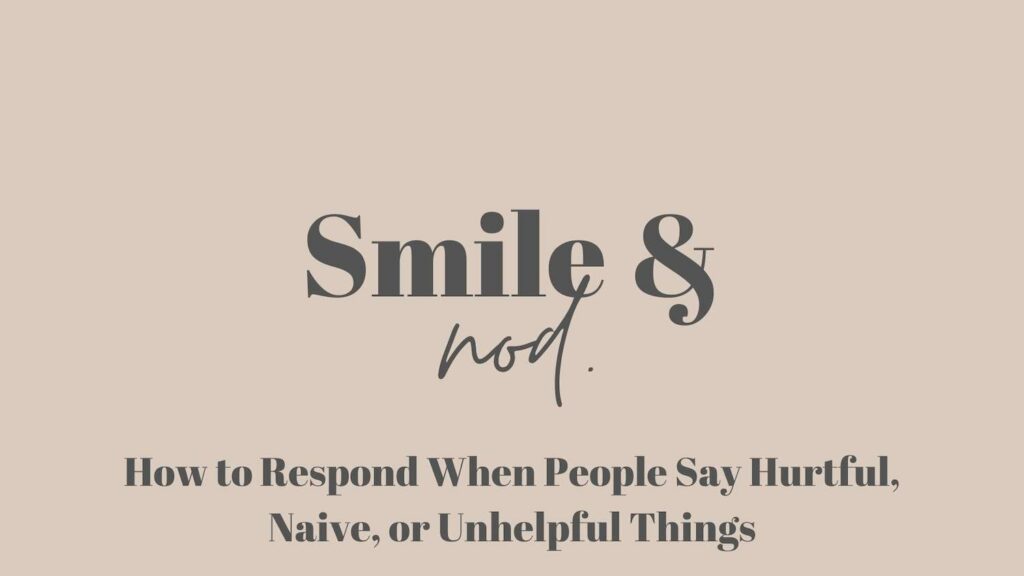It has been 23 years since my husband passed away, yet two comments still two still stand out:
“And he left you pregnant?!” YIKES, this is never ever an okay comment to make to a woman even if her husband is alive. Wisdom is to never assume the girl is pregnant even if she appears to be in her 9th month. Many widows arepregnant when their husband dies—oh how overwhelming. Stating the obvious does not help unless you are ready to jump in and help.
Yet for me, my only excuse was that I had birthed 8 children in 10 years and my tummy pooched a bit, but, “NO SIR, my husband did not leave me pregnant.”
Then that same week came a statement at the opposite end of the spectrum, “What weight loss program are you using?” I couldn’t take any more remarks regarding my physical appearance—good or bad. My response was less than graceful, “It’s probably the woman left with 8 kids after the suicide death of my husband weight loss plan.” I wanted to run and hide screaming—are you kidding me?! Every move I make is evaluated and my physical appearance is under scrutiny.
No doubt this has happened to you too. People mean well, they really do but out of their mouths come the most insensitive comments. Unfortunately, even if they have experienced personal loss, they may say the dumbest things.
How should you respond to dumb, insensitive, untimely, and downright hurtful comments?
- Expect and prepare for tactless statements or questions – Proverbs warns us of the impact of thoughtless comments, “Like one who takes off a garment on a cold day, or like vinegar on soda, is he who sings songs to a troubled heart” (Proverbs 25:20) yet they still come our way.
- Smile and nod. Yep, there is no response that will rectify this situation. Whisper to yourself, “They know not what they say.”
- Secure your armor, truly. Our struggles are not against flesh and blood and the enemy will use the mouth of your closest friend or family member to bring the deepest hurt. The best ammunition is to look beyond the physical one spewing the hurtful words to the real adversary.
- Understand that your emotions and responses are heightened during grief. Let the stupid comment go. Most likely it wasn’t meant to harm but rather to encourage you. Think the best of the one who misspoke.
- Hold your response. Once the emotions settle, you may hear the comment from a different perspective.
- Do not take it personally. Often an idle comment spills out because they do not know what else to say. Most likely, the minute the words came out of their mouth, they regretted it. It’s the ole problem of not being able to put toothpaste back inside of the tube. Respond as you would want someone to respond to you.
- Laugh it off! Humor breaks the sting of sorrow. Even though the callous words take you by surprise, they may lighten the moment and bring a laugh later.
- They really don’t know what they are saying. Repeating the inappropriate comment over and over again to yourself only hurts if you let it.
- Season your response with grace to avoid a root of bitterness from planting itself during this unfortunate interaction.
- Pray don’t say. It is natural to want to turn around and vent your feelings to another in response to the sting of the comment; however, there is danger in this. The better reaction is to pray for God to let you know the truth so that you can handle it wisely at a later time and ask God to allow you to forget their painful words.
- Know your identity in Christ. We all experience seasons of insecurity through betrayal, failure, suffering, circumstances, and hurtful relationships. Jesus Christ loves you deeply. He will never forsake you. His death on the cross for you shows that you are cherished as His beloved.
- Learn from this experience. You will be in a position yourself at some point where words will matter to a suffering one. Silence is always best over foot-in-mouth. For example, one of the most common unappreciated comments is, “I understand.” There is no way any of us can really understand the unique situation one is experiencing. A better choice of words would be:
- “I am so very sorry.”
- “I cannot imagine how you must be feeling.”
- “There is no way to understand what you are going through.”
- “Help me understand what it feels like to ______________.”






